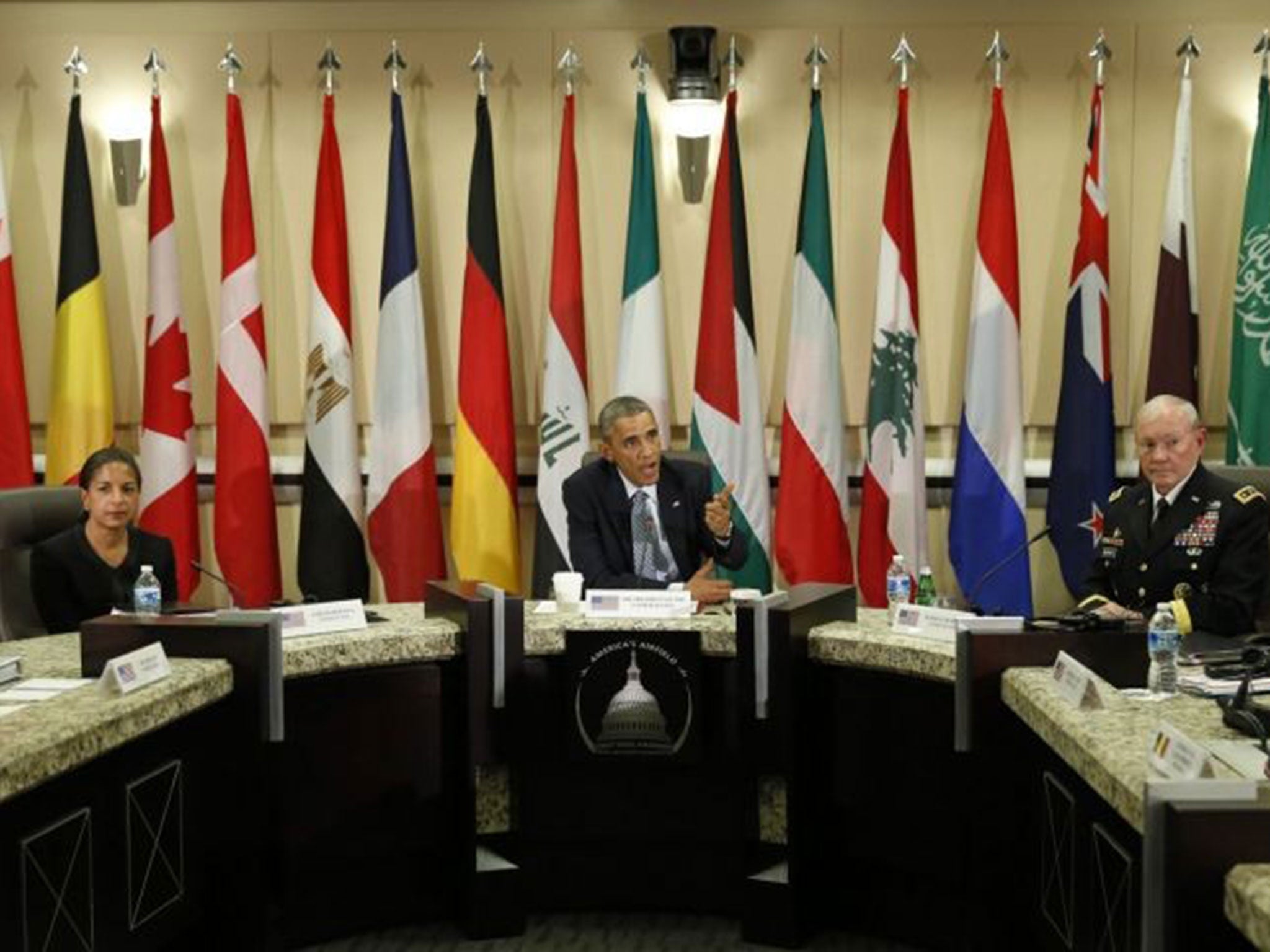Your support helps us to tell the story
From reproductive rights to climate change to Big Tech, The Independent is on the ground when the story is developing. Whether it's investigating the financials of Elon Musk's pro-Trump PAC or producing our latest documentary, 'The A Word', which shines a light on the American women fighting for reproductive rights, we know how important it is to parse out the facts from the messaging.
At such a critical moment in US history, we need reporters on the ground. Your donation allows us to keep sending journalists to speak to both sides of the story.
The Independent is trusted by Americans across the entire political spectrum. And unlike many other quality news outlets, we choose not to lock Americans out of our reporting and analysis with paywalls. We believe quality journalism should be available to everyone, paid for by those who can afford it.
Your support makes all the difference.President Barack Obama met top defence officials from some 20 countries in the anti-Isis coalition today. The session was formally led by General Martin Dempsey, Chairman of the US Joint Chiefs of Staff, the President’s top uniformed military adviser, and, it was announced, no immediate decisions were to be expected. Ostensibly the session was about reviewing and plotting strategy against the Islamist militant organisation. In fact, it is a test of President Obama’s mettle and his commitment to the fight.
Slightly over a month has passed since the US began air strikes against Isis in Syria and Iraq. The reflexive assumption of the American public – if not of the country’s commanders – was that once the group was directly confronted with the might of the world’s most powerful armed forces it would quickly retreat. In fact, the campaign was always going to be a long slog. But even discounting America’s penchant for over-optimism, and its obsession with quick results, it is clear that things are not going well.
The world watches the struggle for Kobani, whose Kurdish defenders, aided by air strikes, appear to have – temporarily at least – halted the progress of besieging Isis forces. However, top US officials say the battle on the Turkish-Syrian border is in reality a sideshow: the priority is Iraq, they insist, and the overriding need to repel Isis there, and somehow keep that disintegrating country together. By that measure alas, the campaign has thus far been an abject failure.
Anbar province is effectively in Isis hands; the Iraqi army is no match for the enemy and hundreds of thousands of new refugees are fleeing the insurgents’ advance, which is now closing in on Baghdad itself. Shia groups meanwhile are reportedly exacting revenge reprisals on Iraqi Sunnis.
Now the grim developments in the Middle East are compounding Mr Obama’s domestic political problems. The comment by John McCain, the ever-hawkish Republican senator and former presidential candidate, that “they’re winning and we’re not”, was predictable. Unfortunately, many Americans, Democrats among them, feel the same way.
For once, foreign policy and national security are emerging as a key issue ahead of November’s mid-term elections, making them more than ever a referendum on Mr Obama. Given the President’s low approval ratings, that only strengthens the likelihood that Republicans will capture the Senate, giving them full control of Congress and transforming this President from lame duck to dead duck.
By ending the wars in Afghanistan and Iraq, and pulling out US troops, Mr Obama sought to extricate the US from the morass of the Middle East and focus on Asia and the Pacific. Instead, he is waist-deep anew in the morass, forced against his instincts to order air strikes, but vowing that there will be no return of ground troops. The President sees his approach as logical. His enemies and, more alarmingly, some of his professed allies abroad, see it as weakness.
Some warn of a new Vietnam, but the parallels are imperfect. Unlike Isis, the North Vietnamese never plotted terror attacks on American targets elsewhere, nor did they harbour ambitions of regional hegemony. One parallel does hold however: that of the “slippery slope”.
Mr Obama may maintain that no US combat troops will be deployed, but General Dempsey has left open the possibility, and has ordered low-flying attack helicopters to deny Isis a “straight shot” at Baghdad’s airport. US advisers are reportedly helping co-ordinate Iraqi army operations. However reluctantly the President entered this war, he cannot now get out. If the air campaign does not work, he will sooner or later have to choose whether to raise the stakes with ground troops. It will be the most painful decision yet for a badly faltering presidency.

Join our commenting forum
Join thought-provoking conversations, follow other Independent readers and see their replies
Comments